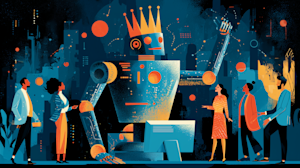AI’s Expanding Frontier: From Actors’ Likeness Rights to Enterprise Agents and SSD Storage
AI is expanding its reach across culture, science, business and the infrastructure that powers a data‑driven world. The week’s AI stories show not only breakthroughs but also governance challenges that come with scale, and the way different industries confront rights, liability, data generation and infrastructure when intelligent systems become central to operations. Taken together, they reveal a common arc: move fast in deployment, but build in guardrails that protect people, data and business value.
In the performing arts, Equity has signaled a bold warning: tech and entertainment companies are using actors’ likenesses, voices and images in AI content without explicit permission. The union reports mounting complaints of copyright infringement and misuse of personal data, raising urgent questions about consent, ownership and the control of one’s own identity in a world where AI can imitate living people. The tension is not just about artistic disruption; it’s about governance, fair compensation and the ethical boundaries of synthetic content that can look and sound authentic. Those debates will shape how content is created, monetized and protected in the near term.
Health care faces a parallel governance challenge. As AI tools proliferate—from interpreting medical scans to aiding diagnoses and hospital operations—experts warn that liability for AI‑assisted missteps could become legally tangled without robust testing, auditing and accountability mechanisms. The promise is real: AI can improve diagnostic accuracy, optimize bed capacity and streamline supply chains. The risk is equally real if responsibility is unclear or if safety nets lag behind rapid development. The takeaway is clear: adoption must be underpinned by rigorous governance so patients and clinicians can trust AI as a partner, not a loophole for blame.
Market research is also being reshaped by AI’s power to model consumer behavior at scale. A new technique called semantic similarity rating enables large language models to generate rich, textual opinions and then translate them into Likert‑style scores. The result is the prospect of synthetic consumer panels—think digital twins of target demographics—that can deliver product insights faster and cheaper than traditional panels. The potential upside is enormous: faster concept testing, more agile experimentation and richer qualitative context behind numerical ratings. Yet experts caution that the method’s validity hinges on high‑quality embeddings and careful calibration with real data to avoid misrepresenting consumer sentiment.
In the enterprise software arena, Salesforce is betting big on AI agents to move beyond pilot projects toward production‑grade automation. Agentforce 360 aims to weave data, apps and a Slack‑driven conversational interface into an ecosystem where AI agents handle a sizable share of work across sales, service, marketing and operations. Early customer results point to efficiency gains, but leaders acknowledge that trust and governance remain essential. Salesforce’s “trust layer”—comprehensive audit trails, compliance checks and observability tools—highlights a central truth: as AI agents become more embedded in business processes, monitoring and guardrails become as important as the models themselves.
Beyond corporate strategy, AI’s influence extends into culture and politics, where public discourse can be shaped by how AI tools curate information and narratives. A Guardian commentary and related coverage illustrate how contemporary debates about the antichrist, extremism and political rhetoric intersect with media ecosystems increasingly influenced by AI. The lesson is not about prophecy but about accountability: digital platforms, search tools and AI‑generated content can magnify narratives in ways that demand renewed attention to media literacy, transparency and the ethics of AI in public life.
Finally, the infrastructure behind AI is being rethought. Industry analyses argue for an SSD‑first future to tame data‑intensive workloads. High‑capacity solid‑state storage promises lower power use, smaller data center footprints and the ability to scale AI workloads to exabyte levels. The argument is practical: HDDs, while cheap per gigabyte, struggle with latency, energy efficiency and density at scale. All‑flash configurations, advanced cooling and new data pipelines are presented as prerequisites for the next wave of AI—from training to real‑time inference—where every watt and square inch counts and where storage design becomes a strategic lever for performance and cost control.
Together, these stories map a multi‑domain AI landscape that demands both innovation and responsibility. The road to widely adopted, trusted AI depends on clear rules about rights and consent, robust safety and liability frameworks, scalable data modeling that respects privacy, enterprise‑grade governance for AI agents, and storage architectures that can sustain ever larger, faster AI workloads without crippling energy use or cost. The AI era is not only about smarter models; it is about building an ecosystem where people, data and systems can thrive together.
Sources
- Equity threatens mass direct action over use of actors’ images in AI content — The Guardian
- AI could make it harder to establish blame for medical failings, experts say — The Guardian
- This new AI technique creates ‘digital twin’ consumers, and it could kill the traditional survey industry — VentureBeat
- Reflection AI Raises $2B, Nvidia Leads Open Source Push — aibusiness.com
- Salesforce bets on AI ‘agents’ to fix what it calls a $7 billion problem in enterprise software — VentureBeat
- The Antichrist has long haunted American politics. Now it’s rearing its head again | Matthew Avery Sutton — The Guardian
- Breaking the bottleneck: Why AI demands an SSD‑first future — VentureBeat
Related posts
-
I fled the US: a foreign, Black, pro-Palestinian activist and the ICE scrutiny
When I arrived in the United States four years ago to pursue a doctorate at Cornell University, I...
5 October 202541LikesBy Amir Najafi -
AI News Roundup: Autocorrect quirks, thinking LRMs, and open-source security
Today’s AI snapshot AI is seeping into every corner of our tech lives, from the quirky behavior of...
1 November 202533LikesBy Amir Najafi -
MiniMax-M2 crowns open-source LLMs for enterprise tool-calling, with a broader AI business momentum
In a market eager for practical AI at scale, MiniMax-M2 has emerged as the new benchmark for open-weight...
27 October 202534LikesBy Amir Najafi


